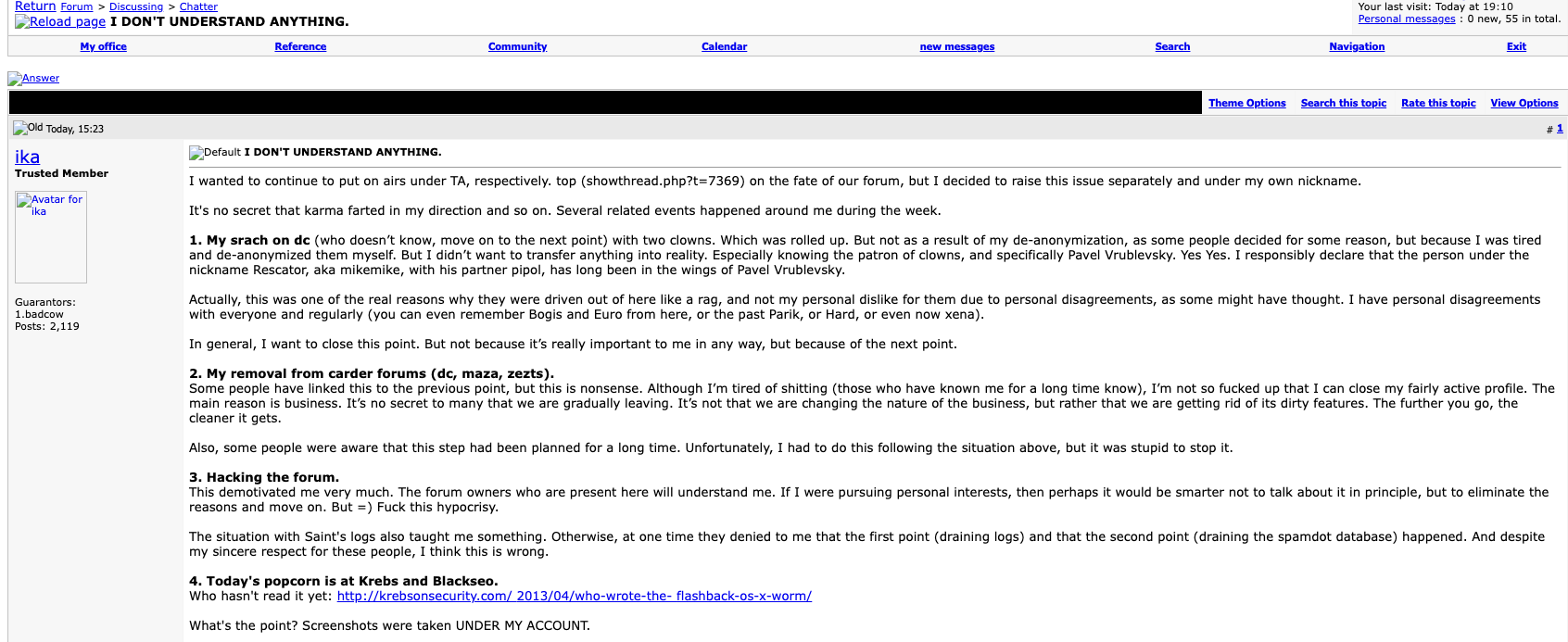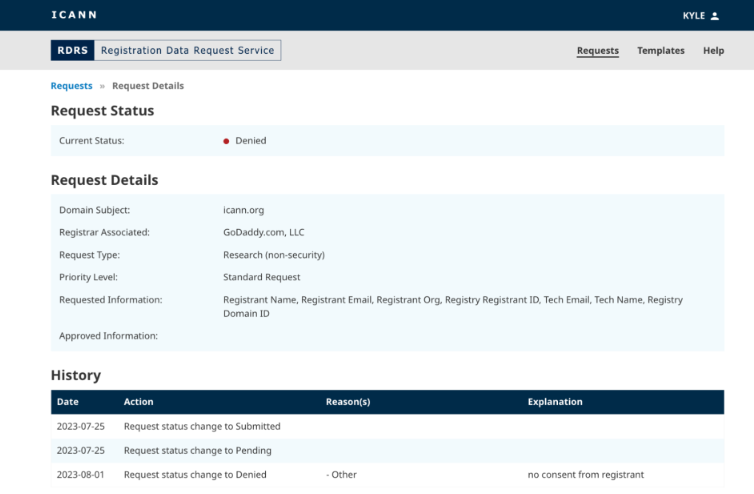Ten Years Later, New Clues in the Target Breach
jeudi 14 décembre 2023 à 18:51On Dec. 18, 2013, KrebsOnSecurity broke the news that U.S. retail giant Target was battling a wide-ranging computer intrusion that compromised more than 40 million customer payment cards over the previous month. The malware used in the Target breach included the text string “Rescator,” which also was the handle chosen by the cybercriminal who was selling all of the cards stolen from Target customers. Ten years later, KrebsOnSecurity has uncovered new clues about the real-life identity of Rescator.

Rescator, advertising a new batch of cards stolen in a 2014 breach at P.F. Chang’s.
Shortly after breaking the Target story, KrebsOnSecurity reported that Rescator appeared to be a hacker from Ukraine. Efforts to confirm my reporting with that individual ended when they declined to answer questions, and after I declined to accept a bribe of $10,000 not to run my story.
That reporting was based on clues from an early Russian cybercrime forum in which a hacker named Rescator — using the same profile image that Rescator was known to use on other forums — claimed to have originally been known as “Helkern,” the nickname chosen by the administrator of a cybercrime forum called Darklife.
KrebsOnSecurity began revisiting the research into Rescator’s real-life identity in 2018, after the U.S. Department of Justice unsealed an indictment that named a different Ukrainian man as Helkern.
It may be helpful to first recap why Rescator is thought to be so closely tied to the Target breach. For starters, the text string “Rescator” was found in some of the malware used in the Target breach. Investigators would later determine that a variant of the malware used in the Target breach was used in 2014 to steal 56 million payment cards from Home Depot customers. And once again, cards stolen in the Home Depot breach were sold exclusively at Rescator’s shops.
On Nov. 25, 2013, two days before Target said the breach officially began, Rescator could be seen in instant messages hiring another forum member to verify 400,000 payment cards that Rescator claimed were freshly stolen.
By the first week of December 2013, Rescator’s online store — rescator[.]la — was selling more than six million payment card records stolen from Target customers. Prior to the Target breach, Rescator had mostly sold much smaller batches of stolen card and identity data, and the website allowed cybercriminals to automate the sending of fraudulent wire transfers to money mules based in Lviv, Ukraine.
Finally, there is some honor among thieves, and in the marketplace for stolen payment card data it is considered poor form to advertise a batch of cards as “yours” if you are merely reselling cards sold to you by a third-party card vendor or thief. When serious stolen payment card shop vendors wish to communicate that a batch of cards is uniquely their handiwork or that of their immediate crew, they refer to it as “our base.” And Rescator was quite clear in his advertisements that these millions of cards were obtained firsthand.
FLASHBACK
The new clues about Rescator’s identity came into focus when I revisited the reporting around an April 2013 story here that identified the author of the OSX Flashback Trojan, an early Mac malware strain that quickly spread to more than 650,000 Mac computers worldwide in 2012.
That story about the Flashback author was possible because a source had obtained a Web browser authentication cookie for a founding member of a Russian cybercrime forum called BlackSEO. Anyone in possession of that cookie could then browse the invite-only BlackSEO forum and read the user’s private messages without having to log in.

BlackSEO.com VIP member “Mavook” tells forum admin Ika in a private message that he is the Flashback author.
The legitimate owner of that BlackSEO user cookie went by the nickname Ika, and Ika’s private messages on the forum showed he was close friends with the Flashback author. At the time, Ika also was the administrator of Pustota[.]pw — a closely-guarded Russian forum that counted among its members some of the world’s most successful and established spammers and malware writers.
For many years, Ika held a key position at one of Russia’s largest Internet service providers, and his (mostly glowing) reputation as a reliable provider of web hosting to the Russian cybercrime community gave him an encyclopedic knowledge about nearly every major player in that scene at the time.
The story on the Flashback author featured redacted screenshots that were taken from Ika’s BlackSEO account (see image above). The day after that story ran, Ika posted a farewell address to his mates, expressing shock and bewilderment over the apparent compromise of his BlackSEO account.
In a lengthy post on April 4, 2013 titled “I DON’T UNDERSTAND ANYTHING,” Ika told Pustota forum members he was so spooked by recent events that he was closing the forum and quitting the cybercrime business entirely. Ika recounted how the Flashback story had come the same week that rival cybercriminals tried to “dox” him (their dox named the wrong individual, but included some of Ika’s more guarded identities).
“It’s no secret that karma farted in my direction,” Ika said at the beginning of his post. Unbeknownst to Ika at the time, his Pustota forum also had been completely hacked that week, and a copy of its database shared with this author.

A Google translated version of the farewell post from Ika, the administrator of Pustota, a Russian language cybercrime forum focused on botnets and spam. Click to enlarge.
Ika said the two individuals who tried to dox him did so on an even more guarded Russian language forum — DirectConnection[.]ws, perhaps the most exclusive Russian cybercrime community ever created. New applicants of this forum had to pay a non-refundable deposit, and receive vouches by three established cybercriminals already on the forum. Even if one managed to steal (or guess) a user’s DirectConnection password, the login page could not be reached unless the visitor also possessed a special browser certificate that the forum administrator gave only to approved members.
In no uncertain terms, Ika declared that Rescator went by the nickname MikeMike on DirectConnection:
“I did not want to bring any of this to real life. Especially since I knew the patron of the clowns – specifically Pavel Vrublevsky. Yes, I do state with confidence that the man with the nickname Rescator a.k.a. MikeMike with his partner Pipol have been Pavel Vrublevsky’s puppets for a long time.”
Pavel Vrublevsky is a convicted cybercriminal who became famous as the CEO of the Russian e-payments company ChronoPay, which specialized in facilitating online payments for a variety of “high-risk” businesses, including gambling, pirated Mp3 files, rogue antivirus software and “male enhancement” pills.
As detailed in my 2014 book Spam Nation, Vrublevsky not-so-secretly ran a pharmacy affiliate spam program called Rx-Promotion, which paid spammers and virus writers to blast out tens of billions of junk emails advertising generic Viagra and controlled pharmaceuticals like pain relief medications. Much of my reporting on Vrublevsky’s cybercrime empire came from several years worth of internal ChronoPay emails and documents that were leaked online in 2010 and 2011.

Pavel Vrublevsky’s former Facebook profile photo.
ZAXVATMIRA
In 2014, KrebsOnSecurity learned from a trusted source close to the Target breach investigation that the user MikeMike on DirectConnection — the same account that Ika said belonged to Rescator — used the email address “zaxvatmira@gmail.com.”
At the time, KrebsOnSecurity could not connect that email address to anything or anyone. However, a recent search on zaxvatmira@gmail.com at the breach tracking service Constella Intelligence returns just one result: An account created in November 2010 at the site searchengines[.]ru under the handle “r-fac1.”
A search on “r-fac1” at cyber intelligence firm Intel 471 revealed that this user’s introductory post on searchengines[.]ru advertised musictransferonline[.]com, an affiliate program that paid people to drive traffic to sites that sold pirated music files for pennies apiece.
According to leaked ChronoPay emails from 2010, this domain was registered and paid for by ChronoPay. Those missives also show that in August 2010 Vrublevsky authorized a payment of ~$1,200 for a multi-user license of an Intranet service called MegaPlan.
ChronoPay used the MegaPlan service to help manage the sprawling projects that Vrublevsky referred to internally as their “black” payment processing operations, including pirated pills, porn, Mp3s, and fake antivirus products. ChronoPay employees used their MegaPlan accounts to track payment disputes, order volumes, and advertising partnerships for these high-risk programs.
Borrowing a page from the Quentin Tarantino movie Reservoir Dogs, the employees adopted nicknames like “Mr. Kink,” “Mr. Heppner,” and “Ms. Nati.” However, in a classic failure of operational security, many of these employees had their MegaPlan account messages automatically forwarded to their real ChronoPay email accounts.
When ChronoPay’s internal emails were leaked in 2010, the username and password for its MegaPlan subscription were still working and valid. An internal user directory for that subscription included the personal (non-ChronoPay) email address tied to each employee Megaplan nickname. That directory listing said the email address zaxvatmira@gmail.com was assigned to the head of the Media/Mp3 division for ChronoPay, pictured at the top left of the organizational chart above as “Babushka Vani and Koli.”
[Author’s note: I initially overlooked the presence of the email address zaxvatmira@gmail.com in my notes because it did not show up in text searches of my saved emails, files or messages. I rediscovered it recently when a text search for zaxvatmira@gmail.com on my Mac found the address in a screenshot of the ChronoPay MegaPlan interface.]
The nickname two rungs down from “Babushka” in the ChronoPay org chart is “Lev Tolstoy,” which the MegaPlan service showed was picked by someone who used the email address v.zhabukin@freefrog-co-ru.
ChronoPay’s emails show that this Freefrog email address belongs to a Vasily Borisovich Zhabykin from Moscow. The Russian business tracking website rusprofile[.]ru reports that Zhabykin is or was the supervisor or owner of three Russian organizations, including one called JSC Hot Spot.
[Author’s note: The word “babushka” means “grandma” in Russian, and it could be that this nickname is a nod to the ChronoPay CEO’s wife, Vera. The leaked ChronoPay emails show that Vera Vrublevsky managed a group of hackers working with their media division, and was at least nominally in charge of MP3 projects for ChronoPay. Indeed, in messages exposed by the leaked ChronoPay email cache, Zhabykin stated that he was “directly subordinate” to Mrs. Vrublevsky].
CYBERCRIME HOTSPOT
JSC Hot Spot is interesting because its co-founder is another ChronoPay employee: 37-year-old Mikhail “Mike” Shefel. A Facebook profile for Mr. Shefel says he is or was vice president of payment systems at ChronoPay. However, the last update on that profile is from 2018, when Shefel appears to have legally changed his last name.
Archive.org shows that Hot Spot’s website — myhotspot[.]ru — sold a variety of consulting services, including IT security assessments, code and system audits, and email marketing. The earliest recorded archive of the Hot Spot website listed three clients on its homepage, including ChronoPay and Freefrog.
ChronoPay internal emails show that Freefrog was one of its investment projects that facilitated the sale of pirated Mp3 files. Rusprofile[.]ru reports that Freefrog’s official company name — JSC Freefrog — is incorporated by a thinly-documented entity based in the Seychelles called Impex Consulting Ltd., and it is unclear who its true owners are.
However, a search at DomainTools.com on the phone number listed on the homepage of myhotspot[.]ru (74957809554) reveals that number is associated with eight domain names.
Six of those domains are some variation of FreeFrog. Another domain registered to that phone number is bothunter[.]me, which included a copyright credit to “Hot Spot 2011.” At the annual Russian Internet Week IT convention in Moscow in 2012, Mr. Shefel gave a short presentation about bothunter, which he described as a service he designed to identify inauthentic (bot) accounts on Russian social media networks.
Interestingly, one of r-fac1’s first posts to Searchengines[.]ru a year earlier saw this user requesting help from other members who had access to large numbers of hacked social media accounts. R-fac1 told forum members that he was only looking to use those accounts to post harmless links and comments to the followers of the hacked profiles, and his post suggested he was testing something.
“Good afternoon,” r-fac1 wrote on Dec. 20, 2010. “I’m looking for people with their own not-recently-registered accounts on forums, (except for search) Social networks, Twitter, blogs, their websites. Tasks, depending on your accounts, post text and a link, sometimes just a link. Most often the topic is chatter, relaxation, discussion. Posting my links in your profiles, on your walls. A separate offer for people with a large set of contacts in instant messengers to try to use viral marketing.”
Neither Mr. Shefel nor Mr. Zhabykin responded to requests for comment.
WHERE ARE THEY NOW?
Mr. Zhabykin soon moved on to bigger ventures, co-founding a cryptocurrency exchange based in Moscow’s financial center called Suex. In September 2021, Suex earned the distinction of becoming the first crypto firm to be sanctioned by the U.S. Department of the Treasury, which effectively blocked Suex from the global financial system. The Treasury alleged Suex helped to process millions in criminal transactions, including the proceeds of numerous ransomware attacks.
“I don’t understand how I got mixed up in this,” Zhabykin told The New York Times in 2021. Zhabykin said Suex, which is registered in the Czech Republic, was mostly a failure and had conducted only a half dozen or so transactions since 2019.
The Russian business tracking service Rusprofile says Zhabykin also is the owner of a company based in the United Kingdom called RideWithLocal; the company’s website says it specializes in arranging excursions for extreme sports, including snowboarding, skiing, surfing and parasailing. Images from the RideWithLocal Facebook page show helicopters dropping snowboarders and skiers atop some fairly steep mountains.

A screenshot from the Facebook page of RideWithLocal.
Constella Intelligence found a cached copy of a now-deleted LinkedIn profile for Mr. Zhabykin, who described himself as a “sporttech/fintech specialist and mentor.”
“I create products and services worldwide, focusing on innovation and global challenges,” his LinkedIn profile said. “I’ve started my career in 2002 and since then I worked in Moscow, different regions of Russia, including Siberia and in Finland, Brazil, United Kingdom, Sri Lanka. Over the last 15 years I contributed to many amazing products in the following industries: sports, ecology, sport tech, fin tech, electronic payments, big data, telecommunications, pulp and paper industry, wood processing and travel. My specialities are Product development, Mentorship, Strategy and Business development.”
Rusprofile reports that Mikhail Borisovich Shefel is associated with at least eight current or now-defunct companies in Russia, including Dengi IM (Money IM), Internet Capital, Internet Lawyer, Internet 2, Zao Hot Spot, and (my personal favorite) an entity incorporated in 2021 called “All the Money in the World.”
Constella Intelligence found several official documents for Mr. Shefel that came from hacked Russian phone, automobile and residence records. They indicate Mr. Shefel is the registrant of a black Porsche Cayenne (Plate:X537SR197) and a Mercedes (Plate:P003PX90). Those vehicle records show Mr. Shefel was born on May 28, 1986.
Rusprofile reveals that at some point near the end of 2018, Shefel changed his last name to Lenin. DomainTools reports that in 2018, Mr. Shefel’s company Internet 2 LLC registered the domain name Lenin[.]me. This now-defunct service sold physical USSR-era Ruble notes that bear the image of Vladimir Lenin, the founding father of the Soviet Union.

Meanwhile, Pavel Vrublevsky remains imprisoned in Russia, awaiting trial on fraud charges levied against the payment company CEO in March 2022. Authorities allege Vrublevsky operated several fraudulent SMS-based payment schemes. They also accused Vrublevsky of facilitating money laundering for Hydra, the largest Russian darknet market. Hydra trafficked in illegal drugs and financial services, including cryptocurrency tumbling for money laundering, exchange services between cryptocurrency and Russian rubles, and the sale of falsified documents and hacking services.
In 2013, Vrublevsky was sentenced to 2.5 years in a Russian penal colony for convincing one of his top spammers and botmasters to launch a distributed denial-of-service (DDoS) attack against a ChronoPay competitor that shut down the ticketing system for the state-owned Aeroflot airline.
Following his release, Vrublevsky began working on a new digital payments platform based in Hong Kong called HPay Ltd (a.k.a. Hong Kong Processing Corporation). HPay appears to have had a great number of clients that were running schemes which bamboozled people with fake lotteries and prize contests.
KrebsOnSecurity sought comment on this research from the Federal Bureau of Investigation (FBI) and the U.S. Secret Service, both of which have been involved in the Target breach investigation over the years. The FBI declined to comment. The Secret Service declined to confirm or dispute any of the findings, but said it is still interested in hearing from anyone who might have more information.
“The U.S. Secret Service does not comment on any open investigation and won’t confirm or deny the accuracy in any reporting related to a criminal manner,” the agency said in a written statement. “However, If you have any information relating to the subjects referenced in this article, please contact the U.S. Secret Service at mostwanted@usss.dhs.gov. The Secret Service pays a reward for information leading to the arrest of cybercriminals.”





 Since at least February 2023, a service advertised on Telegram called USiSLookups has operated an automated bot that allows anyone to look up the SSN or background report on virtually any American. For prices ranging from $8 to $40 and payable via virtual currency, the bot will return detailed consumer background reports automatically in just a few moments.
Since at least February 2023, a service advertised on Telegram called USiSLookups has operated an automated bot that allows anyone to look up the SSN or background report on virtually any American. For prices ranging from $8 to $40 and payable via virtual currency, the bot will return detailed consumer background reports automatically in just a few moments.